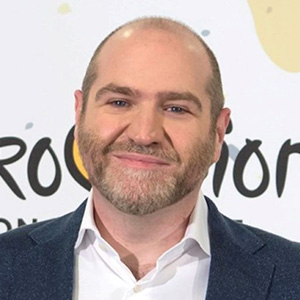Eurovision Song Contest honoured with prestigious Changemaker Award by IBC
18 September 2023
The EBU is honoured to have accepted the inaugural Changemaker Award from the International Broadcasting Convention (IBC) for the impact of the Eurovision Song Contest, the world's largest live music event, at a ceremony in Amsterdam on Sunday 17 September.
The award was given in recognition of the Eurovision Song Contest's remarkable cultural impact and its commitment to technological and digital innovation which promotes unity, diversity, and inclusivity through the power of music.
The Changemaker Award has been given to the Eurovision Song Contest for its “contribution to society and culture – celebrating a brand that continues to stay relevant and fresh on a huge scale”.
“The award recognizes the multifaceted cultural phenomenon and the global production network involved in delivering the event,” said the IBC.
The judges added: “The Contest has been responsible for so many positive changes across the years, in the world of broadcast technology and in wider society. It has been the launchpad for broadcast innovation since the competitors took to the stage in 1956. And it has also been the catalyst for social change in a fragmented world, uniting the countries of Europe and beyond, in their pursuit of a musical dream."
They concluded: “In May 2023, when war-torn Ukraine was unable to host the Contest, and the UK stepped in as the 2022 runner-up, it was a momentous gesture of solidarity between nations. The IBC Changemaker Award stands for positive change - in the broadcast and entertainment world and beyond - and there could not be a more worthy recipient.”
The award was accepted by Martin Österdahl, Executive Supervisor of the Eurovision Song Contest.
He said: “On behalf of the EBU, which strengthens and supports public service media in over 50 countries, I’d like to thank the IBC for this Changemaker award, recognizing the societal and cultural contribution made by the Eurovision Song Contest.
“Like the IBC itself, technology and innovation are very much part of the DNA of the Eurovision Song Contest, infusing every aspect of the event since it was created in 1956 to expand broadcasting boundaries.
“At its core, the Contest has always aspired to unite audiences in different countries and celebrate our diversity. From dazzling stage designs to flawless live audiovisual production, cutting-edge technology allows us to bring millions of viewers around the world together through music and three spectacular state-of-the-art shows.
“And the impact goes beyond those three nights every May - the Eurovision Song Contest now connects millions more throughout the year via its social media channels.
“We’re proud of the impact the Eurovision Song Contest continues to have – entertaining audiences, launching new artists, and, in an ever-fractured world, showing we are all united by music.”
Since its inception in 1956, the Eurovision Song Contest, co-produced by public service media organizations from around Europe, has captivated audiences worldwide, showcasing an exceptional array of talent and serving as a cultural platform for artists to express their unique identities. Each year the competition continues to transcend borders, uniting audiences via TV and its digital platforms through the shared experience of music and celebration.
The Eurovision Song Contest has been instrumental in promoting social and cultural progress, advocating for inclusivity and acceptance. Through its commitment to fostering an environment of respect and understanding, the competition has become a catalyst for change - advancing broadcast technology, challenging stereotypes, and championing diverse genres of music from all corners of Europe and Australia.
The 2023 Eurovision Song Contest, organized by the BBC and the EBU on behalf of Ukraine’s UA:PBC, was watched on five continents, with 162 million viewers tuning in to watch the competition over the three live shows and millions more watching online and creating record engagement on the Contest’s digital’s channels.
Next year’s competition, the 68th, will be hosted by SVT on 7, 9 and 11 May in Malmö, Sweden following the broadcaster’s record equaling seventh win.
About the Eurovision Song Contest:
The Eurovision Song Contest is the world’s largest live music event. It is organized annually by the European Broadcasting Union (EBU), the world’s foremost alliance of public service media (PSM).
The competition, in which participating Member broadcasters of the EBU send a new song to represent their nation, has taken place every year since 1956 except in 2020 when the event was cancelled due to the coronavirus pandemic. 27 countries have won the competition at least once.
37 broadcasters took part in the 2023 Eurovision Song Contest in Liverpool which was won by Sweden’s “Tattoo” performed by Loreen who became only the second artist, and the first woman, to win the Contest twice after her success in 2012 with “Euphoria”.
The BBC hosted the event on Ukraine’s behalf following their win in Turin in 2022 with Kalush Orchestra’s “Stefania”.
About the EBU
The European Broadcasting Union (EBU) is the world’s leading alliance of public service media (PSM). We have 112 member organizations in 56 countries and have an additional 30 Associates in Asia, Africa, Australasia and the Americas. Our Members operate nearly 2,000 television, radio and online channels and services, and offer a wealth of content across other platforms.
Together they reach an audience of more than one billion people around the world, broadcasting in 153 languages. We operate Eurovision and Euroradio services.
About IBC:
IBC is the premier annual event for professionals engaged in the creation, management and delivery of entertainment and news content worldwide. Six leading international bodies are the partners behind IBC, representing both exhibitors and visitors.
In 2016 the event had a record attendance, attracting more than 55,000 attendees from 170 countries around the world, exhibiting more than 1,600 of the world's key technology suppliers and showcasing a debate-leading conference.
Relevant links and documents
Contact

Dave Goodman
Digital and Communications Manager - Eurovision Song Contest and Junior Eurovision Song Contest



